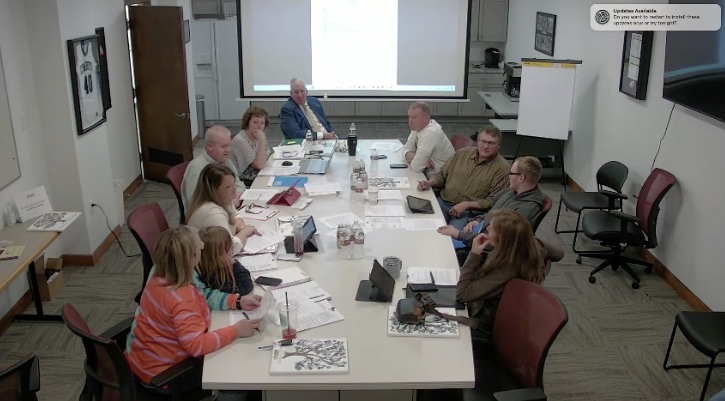Randy Evans is executive director of the Iowa Freedom of Information Council and can be reached at DMRevans2810@gmail.com.
You don’t often hear anyone extol the benefits of the COVID-19 pandemic. But I did a few weeks ago—when I stood before the Storm Lake Kiwanis club and talked about government transparency in Iowa.
I did not wade into the debate over masks, social distancing or vaccinations. It was a polite audience, but I was not silly enough to needlessly venture onto that thin ice.
What I said about the pandemic was this: State and local governments embraced, even if grudgingly, the benefits of live-streaming their board meetings during the pandemic so the public could watch from wherever they were.
When the pandemic closed government buildings and shut down most in-person gatherings, Iowa’s cities, counties, school districts and state government agencies purchased video cameras and other technology to make it possible for them to carry their meetings using Zoom, Facebook, YouTube or similar internet or smart phone applications.
The benefits of these “virtual” meetings were quickly apparent. Many people were worried about their safety as COVID-19 sickened or killed scores of Iowans every week. Although Governor Kim Reynolds’ emergency order directed officials to provide a way for the public to monitor these meetings from afar to protect public health, there was an unintended benefit, too: opening these meetings to more people than might otherwise attend.
The pandemic may be behind us. But live-streaming government board meetings should not be a thing of the past—although an Iowa school board demonstrated misplaced priorities this month when it decided to pull the plug on live-streaming its meetings.
The optics of the decision by the Clarion-Goldfield-Dows school board are terrible. The shortsighted decision should trouble residents of the district and should lead Iowans elsewhere to pressure their local elected officials to live-stream their meetings if they are not already doing so. (Editor’s note: You can watch the discussion from the May 9 board meeting here, starting around the 51:25 mark.)
The Clarion-Goldfield-Dows decision should also bother members of the legislature and Governor Reynolds, because, at its core, the decision shows school leaders want as few people keeping an eye on the board and school business—whether that involves local property taxes, the school curriculum, the choice of books or any other topic.
For more than 50 years, the public has been able to attend meetings of city councils, school boards and county supervisors. Most people never do. While some may have little interest in the decisions being made, there may be other factors involved. Some people may have a child-care conflict, health problems, or a disability that keeps them away. They may lack transportation. They may be at work or be out-of-town when the meetings are held.
Live-streaming and keeping an online archive of past meetings gives more people a ready alternative for keeping tabs on what local boards are discussing and deciding.
Here’s an example: Three years ago, the Grundy County Board of Supervisors held a public hearing on a proposed wind turbine ordinance. The governor had lifted her emergency order, and the board decided to stop carrying its meetings online.
But the Grundy Center newspaper stepped in and live-streamed the hearing and posted the full video online afterward. More than 200 people were able to “attend” the hearing that way, and listen to comments for and against the ordinance, without needing to drive to the courthouse in Grundy Center.
The Grundy County supervisors offered no good reason for ending their live-streaming—other than saying it was inconvenient and is not required by Iowa law. Making the meetings more accessible to the public meant nothing to the supervisors.
The Clarion-Goldfield-Dows school board offered similar justification for ending live-streaming of its meetings. It is worth noting, though, the school district will continue to live-stream athletic events.
School board members said if people truly want to know what the board is discussing, people can adjust their schedules and attend the meetings in person. One more detail worth mentioning: The school board’s meetings start at 4:30 p.m.
Another school board member said ending the live-stream will take away the ability of board critics to record the feed and later edit members’ comments to embarrass them or take their statements out of context.
Such logic is troubling. While Iowa’s public meetings law does not require government board meetings to be live-streamed, the spirit of the law certainly suggests openness and transparency should be the norm, so people can better understand the basis and rationale for decisions government boards make.
Many of Iowa’s 325 public school districts have found themselves under the microscope by parents, taxpayers and Iowa lawmakers. These people believe there has been inadequate transparency by school leaders and their governing boards.
Live-streaming these meetings is not a cost issue. In the Clarion-Goldfield-Dows district, the video camera, microphones and related technology already are in place. No additional employees are needed to run the cameras during meetings.
District administrators are to be commended for making student events available so parents, grandparents and others who are not able to attend the games can watch from home. What they fail to understand is that it sends an embarrassing signal to the tax-paying public when the school district is not equally committed to making it more convenient for people to view school board meetings where important issues get debated and decided.
If the Clarion-Goldfield-Dows board does not reverse itself, and if other local governments do not begin providing remote access to their meetings, perhaps the legislature should step in and amend the open meetings law to require government boards to let the public watch remotely without having to be there in person.

